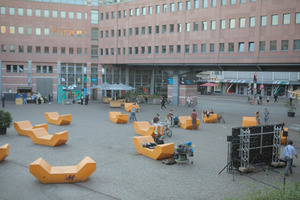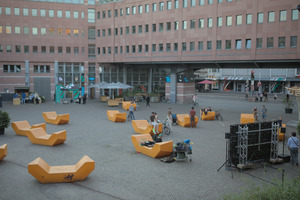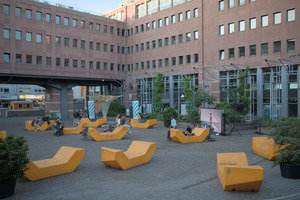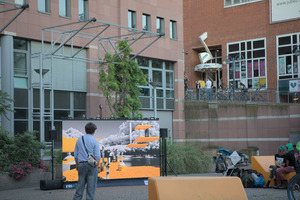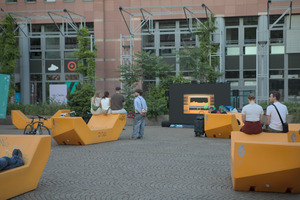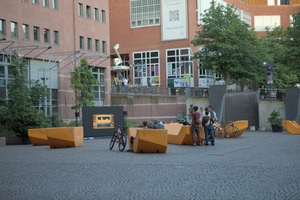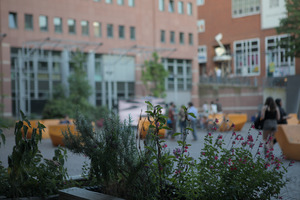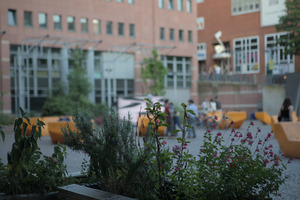Víctor Fancelli Capdevila
| Name | Víctor Fancelli Capdevila |
| Links | |
| Kurzbiographie | Víctor Fancelli Capdevila arbeitet als Digital Archivist. |
151 Inhalte
- Seite 1 von 13
Ansicht von Echos and Archives Part II – Im Strudel der Daten und flüchtigen Scheine am Kronenplatz
- Titel
- Ansicht von Echos and Archives Part II – Im Strudel der Daten und flüchtigen Scheine am Kronenplatz
- Autor/in
- Beschreibung (de)
- Das Künstler*innen Kollektiv Francis Karat mobilisiert für die Bunte Nacht der Digitalisierung KI-Modelle und lässt sie die Abstraktionen der Verwaltung 4.0 halluzinieren. Die Gedanken eines Maschinenaufsehers aus der Zukunft verlieren sich in einer futuristischen Reimagination des Markerschen Fotoromans. Durch ein Rearrangement der bekannten gelben Straßenblockaden bricht die Geschichte aus der Leinwand heraus und interagiert mit dem Kronenplatz.
- Kategorie
- Typ des Projekts/Werks
- Schlagworte
- Datierung
- 07.06.2024
- Ort: Institution
- Ort
- Kronenzplatz
- Stadt
- Land
- Beteiligte Institution(en)
- Internetlinks
- Titel
- Ansicht von Echos and Archives Part II – Im Strudel der Daten und flüchtigen Scheine am Kronenplatz
- Titel (en)
- Views of Echos and Archives Part II – Im Strudel der Daten und flüchtigen Scheine in Kronenplatz
- Urheberrechtshinweis
- Francis Karat; photo: Víctor Fancelli Capdevila
- Rechtsschutz/Lizenz
- Freigabe Nutzung HfG
- Medienersteller/in
- Beziehung/Funktion
- Medien-Beschreibung
- Ansichten der Installation Echos and Archives Part II – Im Strudel der Daten und flüchtigen Scheine am Kronenplatz
- Medien-Beschreibung (en)
- Views of the installation Echos and Archives Part II – Im Strudel der Daten und flüchtigen Scheine at Kronenplatz
- Importiert am
- 10.06.2024
- Übergeordnete Sets
- 1
Ansicht von Echos and Archives Part II – Im Strudel der Daten und flüchtigen Scheine am Kronenplatz
- Titel
- Ansicht von Echos and Archives Part II – Im Strudel der Daten und flüchtigen Scheine am Kronenplatz
- Autor/in
- Beschreibung (de)
- Das Künstler*innen Kollektiv Francis Karat mobilisiert für die Bunte Nacht der Digitalisierung KI-Modelle und lässt sie die Abstraktionen der Verwaltung 4.0 halluzinieren. Die Gedanken eines Maschinenaufsehers aus der Zukunft verlieren sich in einer futuristischen Reimagination des Markerschen Fotoromans. Durch ein Rearrangement der bekannten gelben Straßenblockaden bricht die Geschichte aus der Leinwand heraus und interagiert mit dem Kronenplatz.
- Kategorie
- Typ des Projekts/Werks
- Schlagworte
- Datierung
- 07.06.2024
- Ort: Institution
- Ort
- Kronenzplatz
- Stadt
- Land
- Beteiligte Institution(en)
- Internetlinks
- Titel
- Ansicht von Echos and Archives Part II – Im Strudel der Daten und flüchtigen Scheine am Kronenplatz
- Titel (en)
- Views of Echos and Archives Part II – Im Strudel der Daten und flüchtigen Scheine in Kronenplatz
- Urheberrechtshinweis
- Francis Karat; photo: Víctor Fancelli Capdevila
- Rechtsschutz/Lizenz
- Freigabe Nutzung HfG
- Medienersteller/in
- Beziehung/Funktion
- Medien-Beschreibung
- Ansichten der Installation Echos and Archives Part II – Im Strudel der Daten und flüchtigen Scheine am Kronenplatz
- Medien-Beschreibung (en)
- Views of the installation Echos and Archives Part II – Im Strudel der Daten und flüchtigen Scheine at Kronenplatz
- Importiert am
- 10.06.2024
- Übergeordnete Sets
- 1
Ansicht von Echos and Archives Part II – Im Strudel der Daten und flüchtigen Scheine am Kronenplatz
- Titel
- Ansicht von Echos and Archives Part II – Im Strudel der Daten und flüchtigen Scheine am Kronenplatz
- Autor/in
- Beschreibung (de)
- Das Künstler*innen Kollektiv Francis Karat mobilisiert für die Bunte Nacht der Digitalisierung KI-Modelle und lässt sie die Abstraktionen der Verwaltung 4.0 halluzinieren. Die Gedanken eines Maschinenaufsehers aus der Zukunft verlieren sich in einer futuristischen Reimagination des Markerschen Fotoromans. Durch ein Rearrangement der bekannten gelben Straßenblockaden bricht die Geschichte aus der Leinwand heraus und interagiert mit dem Kronenplatz.
- Kategorie
- Typ des Projekts/Werks
- Schlagworte
- Datierung
- 07.06.2024
- Ort: Institution
- Ort
- Kronenzplatz
- Stadt
- Land
- Beteiligte Institution(en)
- Internetlinks
- Titel
- Ansicht von Echos and Archives Part II – Im Strudel der Daten und flüchtigen Scheine am Kronenplatz
- Titel (en)
- Views of Echos and Archives Part II – Im Strudel der Daten und flüchtigen Scheine in Kronenplatz
- Urheberrechtshinweis
- Francis Karat; photo: Víctor Fancelli Capdevila
- Rechtsschutz/Lizenz
- Freigabe Nutzung HfG
- Medienersteller/in
- Beziehung/Funktion
- Medien-Beschreibung
- Ansichten der Installation Echos and Archives Part II – Im Strudel der Daten und flüchtigen Scheine am Kronenplatz
- Medien-Beschreibung (en)
- Views of the installation Echos and Archives Part II – Im Strudel der Daten und flüchtigen Scheine at Kronenplatz
- Importiert am
- 10.06.2024
- Übergeordnete Sets
- 1
Ansicht von Echos and Archives Part II – Im Strudel der Daten und flüchtigen Scheine am Kronenplatz
- Titel
- Ansicht von Echos and Archives Part II – Im Strudel der Daten und flüchtigen Scheine am Kronenplatz
- Autor/in
- Beschreibung (de)
- Das Künstler*innen Kollektiv Francis Karat mobilisiert für die Bunte Nacht der Digitalisierung KI-Modelle und lässt sie die Abstraktionen der Verwaltung 4.0 halluzinieren. Die Gedanken eines Maschinenaufsehers aus der Zukunft verlieren sich in einer futuristischen Reimagination des Markerschen Fotoromans. Durch ein Rearrangement der bekannten gelben Straßenblockaden bricht die Geschichte aus der Leinwand heraus und interagiert mit dem Kronenplatz.
- Kategorie
- Typ des Projekts/Werks
- Schlagworte
- Datierung
- 07.06.2024
- Ort: Institution
- Ort
- Kronenzplatz
- Stadt
- Land
- Beteiligte Institution(en)
- Internetlinks
- Titel
- Ansicht von Echos and Archives Part II – Im Strudel der Daten und flüchtigen Scheine am Kronenplatz
- Titel (en)
- Views of Echos and Archives Part II – Im Strudel der Daten und flüchtigen Scheine in Kronenplatz
- Urheberrechtshinweis
- Francis Karat; photo: Víctor Fancelli Capdevila
- Rechtsschutz/Lizenz
- Freigabe Nutzung HfG
- Medienersteller/in
- Beziehung/Funktion
- Medien-Beschreibung
- Ansichten der Installation Echos and Archives Part II – Im Strudel der Daten und flüchtigen Scheine am Kronenplatz
- Medien-Beschreibung (en)
- Views of the installation Echos and Archives Part II – Im Strudel der Daten und flüchtigen Scheine at Kronenplatz
- Importiert am
- 10.06.2024
- Übergeordnete Sets
- 1
Ansicht von Echos and Archives Part II – Im Strudel der Daten und flüchtigen Scheine am Kronenplatz
- Titel
- Ansicht von Echos and Archives Part II – Im Strudel der Daten und flüchtigen Scheine am Kronenplatz
- Autor/in
- Beschreibung (de)
- Das Künstler*innen Kollektiv Francis Karat mobilisiert für die Bunte Nacht der Digitalisierung KI-Modelle und lässt sie die Abstraktionen der Verwaltung 4.0 halluzinieren. Die Gedanken eines Maschinenaufsehers aus der Zukunft verlieren sich in einer futuristischen Reimagination des Markerschen Fotoromans. Durch ein Rearrangement der bekannten gelben Straßenblockaden bricht die Geschichte aus der Leinwand heraus und interagiert mit dem Kronenplatz.
- Kategorie
- Typ des Projekts/Werks
- Schlagworte
- Datierung
- 07.06.2024
- Ort: Institution
- Ort
- Kronenzplatz
- Stadt
- Land
- Beteiligte Institution(en)
- Internetlinks
- Titel
- Ansicht von Echos and Archives Part II – Im Strudel der Daten und flüchtigen Scheine am Kronenplatz
- Titel (en)
- Views of Echos and Archives Part II – Im Strudel der Daten und flüchtigen Scheine in Kronenplatz
- Urheberrechtshinweis
- Francis Karat; photo: Víctor Fancelli Capdevila
- Rechtsschutz/Lizenz
- Freigabe Nutzung HfG
- Medienersteller/in
- Beziehung/Funktion
- Medien-Beschreibung
- Ansichten der Installation Echos and Archives Part II – Im Strudel der Daten und flüchtigen Scheine am Kronenplatz
- Medien-Beschreibung (en)
- Views of the installation Echos and Archives Part II – Im Strudel der Daten und flüchtigen Scheine at Kronenplatz
- Importiert am
- 10.06.2024
- Übergeordnete Sets
- 1
Ansicht von Echos and Archives Part II – Im Strudel der Daten und flüchtigen Scheine am Kronenplatz
- Titel
- Ansicht von Echos and Archives Part II – Im Strudel der Daten und flüchtigen Scheine am Kronenplatz
- Autor/in
- Beschreibung (de)
- Das Künstler*innen Kollektiv Francis Karat mobilisiert für die Bunte Nacht der Digitalisierung KI-Modelle und lässt sie die Abstraktionen der Verwaltung 4.0 halluzinieren. Die Gedanken eines Maschinenaufsehers aus der Zukunft verlieren sich in einer futuristischen Reimagination des Markerschen Fotoromans. Durch ein Rearrangement der bekannten gelben Straßenblockaden bricht die Geschichte aus der Leinwand heraus und interagiert mit dem Kronenplatz.
- Kategorie
- Typ des Projekts/Werks
- Schlagworte
- Datierung
- 07.06.2024
- Ort: Institution
- Ort
- Kronenzplatz
- Stadt
- Land
- Beteiligte Institution(en)
- Internetlinks
- Titel
- Ansicht von Echos and Archives Part II – Im Strudel der Daten und flüchtigen Scheine am Kronenplatz
- Titel (en)
- Views of Echos and Archives Part II – Im Strudel der Daten und flüchtigen Scheine in Kronenplatz
- Urheberrechtshinweis
- Francis Karat; photo: Víctor Fancelli Capdevila
- Rechtsschutz/Lizenz
- Freigabe Nutzung HfG
- Medienersteller/in
- Beziehung/Funktion
- Medien-Beschreibung
- Ansichten der Installation Echos and Archives Part II – Im Strudel der Daten und flüchtigen Scheine am Kronenplatz
- Medien-Beschreibung (en)
- Views of the installation Echos and Archives Part II – Im Strudel der Daten und flüchtigen Scheine at Kronenplatz
- Importiert am
- 10.06.2024
- Übergeordnete Sets
- 1
Ansicht von Echos and Archives Part II – Im Strudel der Daten und flüchtigen Scheine am Kronenplatz
- Titel
- Ansicht von Echos and Archives Part II – Im Strudel der Daten und flüchtigen Scheine am Kronenplatz
- Autor/in
- Beschreibung (de)
- Das Künstler*innen Kollektiv Francis Karat mobilisiert für die Bunte Nacht der Digitalisierung KI-Modelle und lässt sie die Abstraktionen der Verwaltung 4.0 halluzinieren. Die Gedanken eines Maschinenaufsehers aus der Zukunft verlieren sich in einer futuristischen Reimagination des Markerschen Fotoromans. Durch ein Rearrangement der bekannten gelben Straßenblockaden bricht die Geschichte aus der Leinwand heraus und interagiert mit dem Kronenplatz.
- Kategorie
- Typ des Projekts/Werks
- Schlagworte
- Datierung
- 07.06.2024
- Ort: Institution
- Ort
- Kronenzplatz
- Stadt
- Land
- Beteiligte Institution(en)
- Internetlinks
- Titel
- Ansicht von Echos and Archives Part II – Im Strudel der Daten und flüchtigen Scheine am Kronenplatz
- Titel (en)
- Views of Echos and Archives Part II – Im Strudel der Daten und flüchtigen Scheine in Kronenplatz
- Urheberrechtshinweis
- Francis Karat; photo: Víctor Fancelli Capdevila
- Rechtsschutz/Lizenz
- Freigabe Nutzung HfG
- Medienersteller/in
- Beziehung/Funktion
- Medien-Beschreibung
- Ansichten der Installation Echos and Archives Part II – Im Strudel der Daten und flüchtigen Scheine am Kronenplatz
- Medien-Beschreibung (en)
- Views of the installation Echos and Archives Part II – Im Strudel der Daten und flüchtigen Scheine at Kronenplatz
- Importiert am
- 10.06.2024
- Übergeordnete Sets
- 1
Ansicht von Echos and Archives Part II – Im Strudel der Daten und flüchtigen Scheine am Kronenplatz
- Titel
- Ansicht von Echos and Archives Part II – Im Strudel der Daten und flüchtigen Scheine am Kronenplatz
- Autor/in
- Beschreibung (de)
- Das Künstler*innen Kollektiv Francis Karat mobilisiert für die Bunte Nacht der Digitalisierung KI-Modelle und lässt sie die Abstraktionen der Verwaltung 4.0 halluzinieren. Die Gedanken eines Maschinenaufsehers aus der Zukunft verlieren sich in einer futuristischen Reimagination des Markerschen Fotoromans. Durch ein Rearrangement der bekannten gelben Straßenblockaden bricht die Geschichte aus der Leinwand heraus und interagiert mit dem Kronenplatz.
- Kategorie
- Typ des Projekts/Werks
- Schlagworte
- Datierung
- 07.06.2024
- Ort: Institution
- Ort
- Kronenzplatz
- Stadt
- Land
- Beteiligte Institution(en)
- Internetlinks
- Titel
- Ansicht von Echos and Archives Part II – Im Strudel der Daten und flüchtigen Scheine am Kronenplatz
- Titel (en)
- Views of Echos and Archives Part II – Im Strudel der Daten und flüchtigen Scheine in Kronenplatz
- Urheberrechtshinweis
- Francis Karat; photo: Víctor Fancelli Capdevila
- Rechtsschutz/Lizenz
- Freigabe Nutzung HfG
- Medienersteller/in
- Beziehung/Funktion
- Medien-Beschreibung
- Ansichten der Installation Echos and Archives Part II – Im Strudel der Daten und flüchtigen Scheine am Kronenplatz
- Medien-Beschreibung (en)
- Views of the installation Echos and Archives Part II – Im Strudel der Daten und flüchtigen Scheine at Kronenplatz
- Importiert am
- 10.06.2024
- Übergeordnete Sets
- 1
Ansicht von Echos and Archives Part II – Im Strudel der Daten und flüchtigen Scheine am Kronenplatz
- Titel
- Ansicht von Echos and Archives Part II – Im Strudel der Daten und flüchtigen Scheine am Kronenplatz
- Autor/in
- Beschreibung (de)
- Das Künstler*innen Kollektiv Francis Karat mobilisiert für die Bunte Nacht der Digitalisierung KI-Modelle und lässt sie die Abstraktionen der Verwaltung 4.0 halluzinieren. Die Gedanken eines Maschinenaufsehers aus der Zukunft verlieren sich in einer futuristischen Reimagination des Markerschen Fotoromans. Durch ein Rearrangement der bekannten gelben Straßenblockaden bricht die Geschichte aus der Leinwand heraus und interagiert mit dem Kronenplatz.
- Kategorie
- Typ des Projekts/Werks
- Schlagworte
- Datierung
- 07.06.2024
- Ort: Institution
- Ort
- Kronenzplatz
- Stadt
- Land
- Beteiligte Institution(en)
- Internetlinks
- Titel
- Ansicht von Echos and Archives Part II – Im Strudel der Daten und flüchtigen Scheine am Kronenplatz
- Titel (en)
- Views of Echos and Archives Part II – Im Strudel der Daten und flüchtigen Scheine in Kronenplatz
- Urheberrechtshinweis
- Francis Karat; photo: Víctor Fancelli Capdevila
- Rechtsschutz/Lizenz
- Freigabe Nutzung HfG
- Medienersteller/in
- Beziehung/Funktion
- Medien-Beschreibung
- Ansichten der Installation Echos and Archives Part II – Im Strudel der Daten und flüchtigen Scheine am Kronenplatz
- Medien-Beschreibung (en)
- Views of the installation Echos and Archives Part II – Im Strudel der Daten und flüchtigen Scheine at Kronenplatz
- Importiert am
- 10.06.2024
- Übergeordnete Sets
- 1
Ansicht von Echos and Archives Part II – Im Strudel der Daten und flüchtigen Scheine am Kronenplatz
- Titel
- Ansicht von Echos and Archives Part II – Im Strudel der Daten und flüchtigen Scheine am Kronenplatz
- Autor/in
- Beschreibung (de)
- Das Künstler*innen Kollektiv Francis Karat mobilisiert für die Bunte Nacht der Digitalisierung KI-Modelle und lässt sie die Abstraktionen der Verwaltung 4.0 halluzinieren. Die Gedanken eines Maschinenaufsehers aus der Zukunft verlieren sich in einer futuristischen Reimagination des Markerschen Fotoromans. Durch ein Rearrangement der bekannten gelben Straßenblockaden bricht die Geschichte aus der Leinwand heraus und interagiert mit dem Kronenplatz.
- Kategorie
- Typ des Projekts/Werks
- Schlagworte
- Datierung
- 07.06.2024
- Ort: Institution
- Ort
- Kronenzplatz
- Stadt
- Land
- Beteiligte Institution(en)
- Internetlinks
- Titel
- Ansicht von Echos and Archives Part II – Im Strudel der Daten und flüchtigen Scheine am Kronenplatz
- Titel (en)
- Views of Echos and Archives Part II – Im Strudel der Daten und flüchtigen Scheine in Kronenplatz
- Urheberrechtshinweis
- Francis Karat; photo: Víctor Fancelli Capdevila
- Rechtsschutz/Lizenz
- Freigabe Nutzung HfG
- Medienersteller/in
- Beziehung/Funktion
- Medien-Beschreibung
- Ansichten der Installation Echos and Archives Part II – Im Strudel der Daten und flüchtigen Scheine am Kronenplatz
- Medien-Beschreibung (en)
- Views of the installation Echos and Archives Part II – Im Strudel der Daten und flüchtigen Scheine at Kronenplatz
- Importiert am
- 10.06.2024
- Übergeordnete Sets
- 1
Ansicht von Echos and Archives Part II – Im Strudel der Daten und flüchtigen Scheine am Kronenplatz
- Titel
- Ansicht von Echos and Archives Part II – Im Strudel der Daten und flüchtigen Scheine am Kronenplatz
- Autor/in
- Beschreibung (de)
- Das Künstler*innen Kollektiv Francis Karat mobilisiert für die Bunte Nacht der Digitalisierung KI-Modelle und lässt sie die Abstraktionen der Verwaltung 4.0 halluzinieren. Die Gedanken eines Maschinenaufsehers aus der Zukunft verlieren sich in einer futuristischen Reimagination des Markerschen Fotoromans. Durch ein Rearrangement der bekannten gelben Straßenblockaden bricht die Geschichte aus der Leinwand heraus und interagiert mit dem Kronenplatz.
- Kategorie
- Typ des Projekts/Werks
- Schlagworte
- Datierung
- 07.06.2024
- Ort: Institution
- Ort
- Kronenzplatz
- Stadt
- Land
- Beteiligte Institution(en)
- Internetlinks
- Titel
- Ansicht von Echos and Archives Part II – Im Strudel der Daten und flüchtigen Scheine am Kronenplatz
- Titel (en)
- Views of Echos and Archives Part II – Im Strudel der Daten und flüchtigen Scheine in Kronenplatz
- Urheberrechtshinweis
- Francis Karat; photo: Víctor Fancelli Capdevila
- Rechtsschutz/Lizenz
- Freigabe Nutzung HfG
- Medienersteller/in
- Beziehung/Funktion
- Medien-Beschreibung
- Ansichten der Installation Echos and Archives Part II – Im Strudel der Daten und flüchtigen Scheine am Kronenplatz
- Medien-Beschreibung (en)
- Views of the installation Echos and Archives Part II – Im Strudel der Daten und flüchtigen Scheine at Kronenplatz
- Importiert am
- 10.06.2024
- Übergeordnete Sets
- 1
Ansicht von Echos and Archives Part II – Im Strudel der Daten und flüchtigen Scheine am Kronenplatz
- Titel
- Ansicht von Echos and Archives Part II – Im Strudel der Daten und flüchtigen Scheine am Kronenplatz
- Autor/in
- Beschreibung (de)
- Das Künstler*innen Kollektiv Francis Karat mobilisiert für die Bunte Nacht der Digitalisierung KI-Modelle und lässt sie die Abstraktionen der Verwaltung 4.0 halluzinieren. Die Gedanken eines Maschinenaufsehers aus der Zukunft verlieren sich in einer futuristischen Reimagination des Markerschen Fotoromans. Durch ein Rearrangement der bekannten gelben Straßenblockaden bricht die Geschichte aus der Leinwand heraus und interagiert mit dem Kronenplatz.
- Kategorie
- Typ des Projekts/Werks
- Schlagworte
- Datierung
- 07.06.2024
- Ort: Institution
- Ort
- Kronenzplatz
- Stadt
- Land
- Beteiligte Institution(en)
- Internetlinks
- Titel
- Ansicht von Echos and Archives Part II – Im Strudel der Daten und flüchtigen Scheine am Kronenplatz
- Titel (en)
- Views of Echos and Archives Part II – Im Strudel der Daten und flüchtigen Scheine in Kronenplatz
- Urheberrechtshinweis
- Francis Karat; photo: Víctor Fancelli Capdevila
- Rechtsschutz/Lizenz
- Freigabe Nutzung HfG
- Medienersteller/in
- Beziehung/Funktion
- Medien-Beschreibung
- Ansichten der Installation Echos and Archives Part II – Im Strudel der Daten und flüchtigen Scheine am Kronenplatz
- Medien-Beschreibung (en)
- Views of the installation Echos and Archives Part II – Im Strudel der Daten und flüchtigen Scheine at Kronenplatz
- Importiert am
- 10.06.2024
- Übergeordnete Sets
- 1
